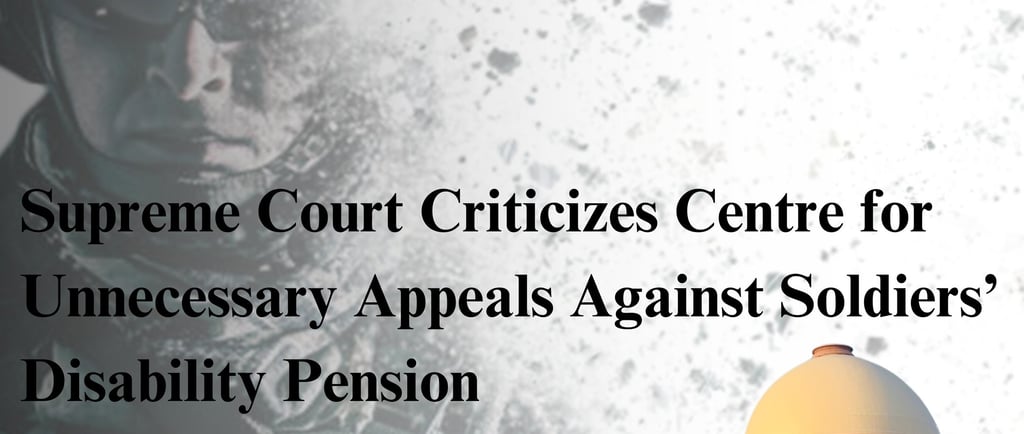Supreme Court Criticizes Centre for Unnecessary Appeals Against Soldiers’ Disability Pension
The Supreme Court on Thursday criticized the Central government for repeatedly filing frivolous appeals against armed forces personnel in disability pension cases. A Bench comprising Justice Abhay S. Oka and Justice Ujjal Bhuyan emphasized the need for a policy to prevent such unnecessary litigation. The Court expressed concern over the lack of scrutiny before dragging soldiers to the apex court, stating that not every recipient of disability pension from the Armed Forces Tribunal should be subjected to further legal battles. Noting that many of these appeals were baseless, the Bench questioned why such cases were being pursued. The matter, which involved an appeal by the government against a retired Army personnel, was adjourned, with the Court directing the government to disclose whether it was willing to formulate a policy on the issue before the next hearing.
1/30/20251 min read


The Supreme Court of India has consistently criticized the Centre for filing unnecessary appeals against disability pensions awarded to armed forces personnel. These appeals often lack merit and impose undue hardship on veterans and their families.
Case Overview:
In a notable instance, the Supreme Court addressed the case of Naik Inderjeet Singh, who died during a counter-terrorism patrol in Jammu and Kashmir. His widow was initially granted a special family pension but was denied a liberalized family pension (LFP). The Armed Forces Tribunal (AFT) directed the payment of LFP along with arrears, recognizing the circumstances of Singh's death as qualifying for such benefits. The Centre appealed this decision.
Court Analysis:
The Supreme Court expressed strong disapproval of the Centre's appeal, emphasizing that such actions were unjust and lacked compassion for the widow. The bench remarked that dragging a widow into court proceedings was "very, very harsh" and highlighted the need for fairness in such cases. The court also noted the absence of an internal mechanism within the government to filter unnecessary appeals, suggesting that this case involved a soldier who died in the line of duty during an operational patrolling duty.
Judgment :
The Supreme Court dismissed the Centre's appeal, upholding the AFT's decision to grant the widow the liberalized family pension. Additionally, the court imposed a cost of ₹50,000 on the Centre for filing the appeal, directing that the amount be paid to the widow within two months. This judgment underscores the Court's commitment to ensuring that veterans and their families receive the benefits they are entitled to without unnecessary legal hurdles.
